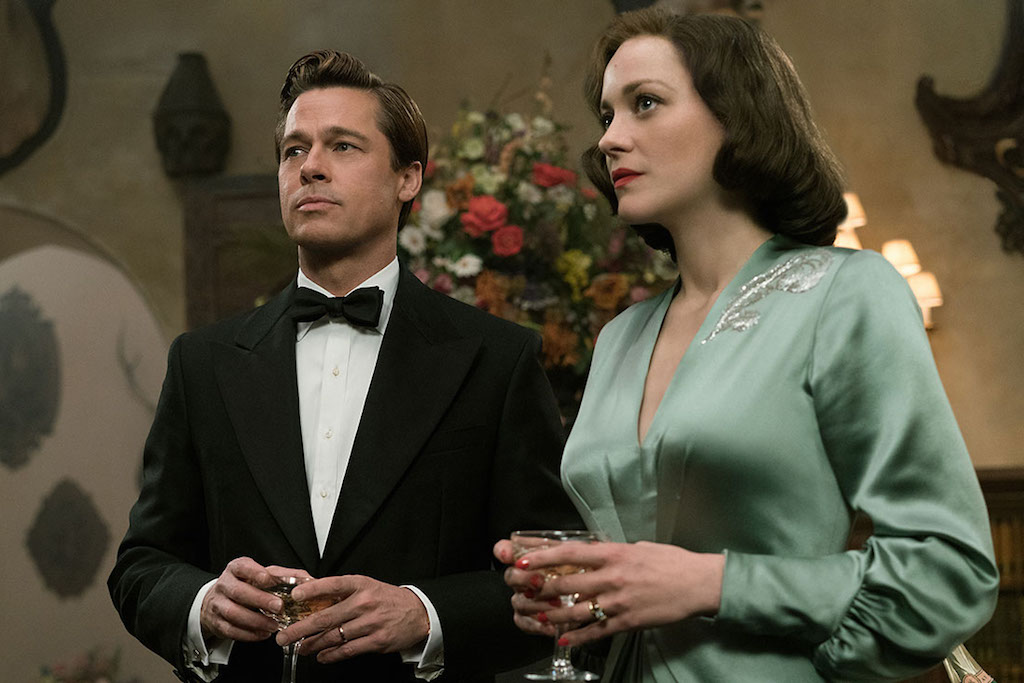Old Glamour And Sad Pitt: Is ‘Allied’ Worth Its Own Hype?
At the very least, it's a nice mix of 'Casablanca' and 'Mr and Mrs Smith'.

Robert Zemeckis is fascinated with fakery. Best known for directing the Back to the Future trilogy and Forrest Gump, his recent career has been steeped in artifice. In motion-capture animated films like The Polar Express and A Christmas Carol, he merrily sleighed into the heart of the uncanny valley; meanwhile, last year’s The Walk showcased both the World Trade Centre (fake) and Joseph Gordon-Levitt’s French accent (faker).
From the trailers, the director’s latest — Allied, a wartime espionage thriller/marital drama starring Brad Pitt and Marion Cotillard — looks to be another step along the tightrope from facsimile to reality, from Beowulf to World War II.
In actuality, the film is a step backwards of sorts: a tribute to classic Hollywood (in particular, Casablanca) which recognises that true emotion rings through whether one’s story is told on a Hollywood soundstage or swathed in cutting-edge CGI. Accordingly, Allied is an old-fashioned slice of adult-orientated entertainment like “they used to make”, where impossibly attractive movie stars tackle big emotions rather than big explosions. (Though there are a couple of those, too.)
We’ll Always Have Casablanca
The film opens in Casablanca. Well, really it opens in “Casablanca”. Just as Michael Curtiz recreated the city on the Warners’ lot in the ‘40s, Zemeckis uses the Canary Islands — heavily augmented with special effects — to stand in for German-occupied Morocco. It’s not an especially convincing illusion. But as you watch a clearly-CGI figure parachute into the desert in the opening scene, or Cotillard and Pitt indulge their desires in the middle of a raging (computer-generated) sandstorm, you don’t get the impression it’s supposed to be.
Just like in 1942, this is Casablanca as fantasy: an idealised intersection of romance and espionage, here owing a not-insignificant debt to the grandeur of classic Hollywood.
This fantastical framework is the perfect setting to establish the relationship between Max (Pitt) and Marianne (Cotillard), a pair of Allied spies who pretend to be married in order to assassinate a high-ranking Nazi. The opening chapter operates as an entertaining, swiftly-paced prologue; Zemeckis and screenwriter Steven Knight have enough respect for their audience to not overplay the dramatic tension. The filmmakers instead smartly prioritise the smouldering sexual tension between Pitt and Cotillard: two people faking a relationship that, by the conclusion of their mission, has transformed into something real.
Or has it? Just as reports that Cotillard was the catalyst for Pitt’s off-screen divorce were swiftly debunked, Allied’s London-based second act casts doubt upon the authenticity of Max and Marianne’s marriage — and the emotions underpinning it — when suspicions emerge that Marianne may in fact be a German spy. Unwilling to believe the accusations, Max defies his superiors’ orders and mounts a search for evidence to exonerate his wife.
The film assumes the tense tenor of a thriller, culminating in a finale at an airport with pathos to rival that of Casablanca. (Another critical scene revolves around a defiant performance of ‘La Marseillaise‘, in case you thought these references might be accidental.)
Allied’s thrills are found in Max’s investigation of his own relationship, questioning his fidelity to his wife and country alike. As an audience member, the asking — which sees Max interrogating family, friends, and Frenchmen — is more compelling than the answer.
The plotting reaches its apex when Max commandeers a plane and slips into occupied France under the cover of night, with the intent of questioning a soldier who worked alongside Marianne in her revolutionary days; as you might expect, things don’t go quite according to plan and a fiery confrontation with German soldiers eventuates.
London’s Burning
That’s not the film’s only firefight. The birth of Max and Marianne’s baby girl is spectacularly (and implausibly) staged in the middle of a German bombing raid, and a party later on in the piece is interrupted by klaxons as Nazi bombers rain destruction upon the city. Due to this sense of impending doom — along with actual on-location shooting and a much darker palette — the London setting feels distinctly different from the romanticised Casablanca section.
Zemeckis’ London also feels different from most World War II-era depictions of the city. Rather than focusing upon the heroic resilience of its citizens and/or Blitzkrieg casualties, Allied sketches a London where debauchery is the norm. The aforementioned party has the bacchanalian wildness that, I suppose, goes hand-in-hand with approaching the perceived end of the world. Most notably, Lizzy Caplan appears as Pitt’s character’s sister, whose lesbian relationship (with Game of Thrones’ Charlotte Hope) goes entirely undisguised despite her position in the military intelligence community.
It’s not all fun and games, though. For every glimpse of (historically-plausible, if not necessarily accurate) hedonism, the film counterbalances with an acknowledgement of the challenges of war. Undercover resistance agents are useless alcoholics, British fighter pilots are terrified boys dosed with drugs, and veterans (like Matthew Goode, making a brief but memorable appearance) are left scarred and forgotten.
Any notions of the nobility of war have been dispelled, along with the illusion of Casablanca. Just as Max questions the truth behind his wife’s identity, Allied questions the truth behind World War II’s heroic myths, and the deliberateness of the opening chapter’s unreality becomes clear.
Sad Pitt
Allied isn’t the first time that Brad Pitt has played a spy on the silver screen. Which is strange, because the actor seems poorly suited to espionage. I like Pitt’s work, don’t get me wrong, but now that he’s aged out of ‘hot dude’, he basically has two modes: Sad Hollywood Dad (Babel, World War Z, this) and charismatic maniac (Fight Club, Twelve Monkeys).
Pitt’s utterly unconvincing as a chameleonic agent of espionage, which directors like the Coen brothers and Quentin Tarantino were smart enough to recognise (in Burn After Reading and Inglourious Basterds respectively). Remember Spy Game? Neither does anyone else. So he’s a bit of a liability on screen, especially in Casablanca where he’s inexplicably embraced into high society while boasting perhaps the worst Parisian accent in cinema history (it’s hard not be reminded of Aldo Raine’s attempts to speak Italian in Basterds).
He does make for a good action hero, though, even as he overplays the ‘I’m conflicted by my emotions dammit’ with a perpetually creased brow.

Pitt’s more convincing tossing a grenade into a German tank than trying to question Marianne without attracting suspicion. Thankfully, the ever-reliable Cotillard is on hand to grant the film’s emotions a solidity that belies the flashiness surrounding them.
And that’s the core of what makes Allied work. Much of it is patently ridiculous — the sandstorm sex scene, Max walking in on his sister’s lover suggestively wrapped around a cello — but its emotional core ensures that it escapes camp, and approximates the melodramatic heft of Casablanca. It’s not the same as watching Bogart and Bergman’s doomed romance but, for a while, you can pretend.
–
Allied is in cinemas from Boxing Day.
–
Dave Crewe is a Brisbane-based teacher and freelance film critic who spends way too much of his time watching movies. Read his stuff at ccpopculture or pester him at @dacrewe.